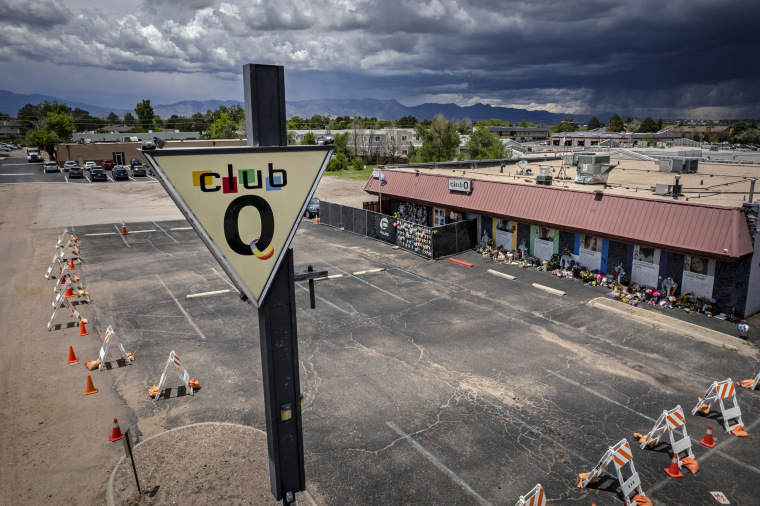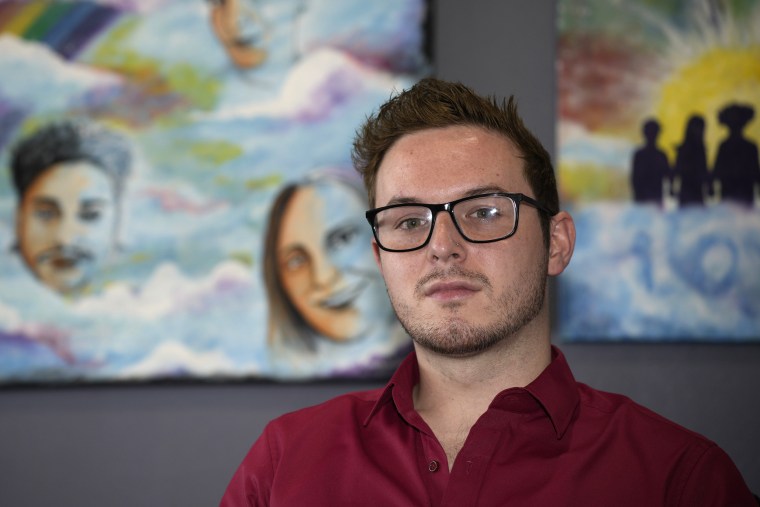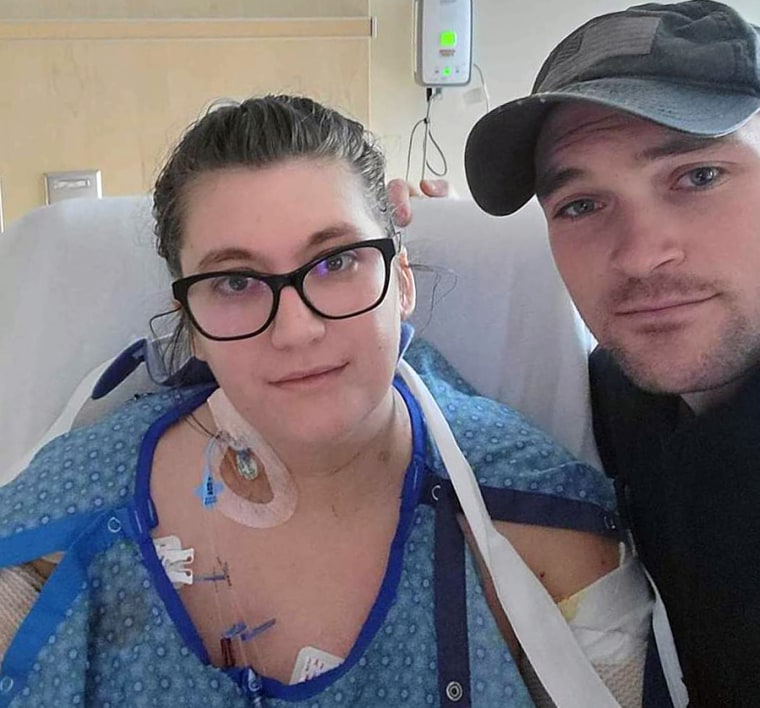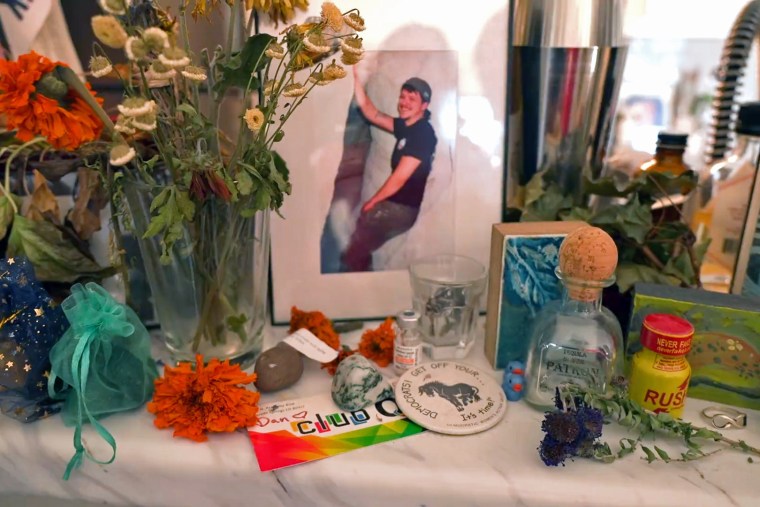COLORADO SPRINGS, Colo. — Sprinkled with handwritten notes, stuffed animals and flowers, a memorial honoring the five victims killed and dozens injured last November still stands along the rainbow facade of the now-shuttered Club Q. The silence at the site ahead of the one-year anniversary of the deadly shooting evoked the community’s grief as it struggles to move forward amid lingering tension.
The queer community here is splintered, divided over Club Q ownership’s goal of reopening what was once a safe and accepting space for LGBTQ residents. Survivors of the shooting also say they’re concerned that the venue’s management team is prioritizing profit over reuniting the community. Meanwhile, as the injured are still healing — physically and emotionally — they say donations intended for them were distributed too slowly and with considerable red tape.
“The community still feels loss, and I think the community still feels lost,” survivor Wyatt Kent told NBC News.

Kent, who uses both he and they pronouns, was a drag performer at Club Q and lost their boyfriend, bartender Daniel Aston, in the shooting. They said trust has dissolved between what they say is a majority of the former staffers and regulars at Club Q on one side, and the Club Q ownership team and the handful of survivors who are now working with them on the other.
Many survivors of the Nov. 19, 2022, shooting, including Kent, said they are uncomfortable with the idea of Club Q reopening in any form, whether it be at the original location or a new location. For months, they’ve been protesting the ownership’s decision to reopen, saying it would force them to relive the trauma of watching a gunman open fire on what was once their safe space.
In February, the venue’s management team said it would reopen the club in the same location and would add an on-site memorial to those killed in the attack. Then, in October, it was announced that the club would reopen in a new location 4 miles away. Construction is currently underway in a former lounge space at the Satellite Hotel in Colorado Springs, with plans to open by the end of the year, when it will simply be called “the Q.”
“There’s amazing opportunities for our community to grow and find new spaces for them to thrive in. I am hesitant to say that the new Q space is that,” Kent said. “There’s plenty of other spaces in our community that uplift better than something that seems like a financial grab. It’s disappointing, but we, the community, create our spaces, and we, the community, keep ourselves safe.”
Michael Anderson, a former Club Q bartender who was working the night of the shooting, has taken on an advocacy role since the tragedy, including testifying before Congress in December against anti-LGBTQ legislation and rhetoric. He also now serves as vice president of operations for Club Q and has been the target of much of the distrust from other survivors.

“From the bottom of my heart, I understand the division in this community. I understand that friends are now fighting friends, and everyone’s turning against each other,” Anderson said. “I hope we can make a choice as a community to say, ‘I may not agree with what you did here,’ [and that] we can have these conversations and address the divide and the differences.”
When asked specifically about some survivors’ concerns that Club Q management is, as they put it, “trying to profit off of queer pain” by reopening Club Q, Anderson called this a “disingenuous criticism” that he doesn’t “take seriously.”
“My biggest concern is succeeding, not profiting,” he said, referring to the new Q space as “a humble venue.” “Every person is welcome in this building. However, if you don’t want to support it, that’s perfectly OK, too.”
Adding to the complicated aftermath, survivors say they have experienced issues with receiving donations raised for them.
Approximately $3.25 million in donations came pouring in for people affected by shooting through the Colorado Healing Fund, a nonprofit formed to help victims of mass casualties in the state. But survivors said they weren’t pleased with the organization’s original plan to allocate 10% of the donations toward the fund’s “administrative costs” and what they saw as a lack of transparency regarding the allocation of the rest of the millions raised. They also said it took months before they saw any financial help, including help with covering their medical bills.
“Everything’s been a healing process, but mainly just a lot of continuous battles,” Ashtin Gamblin, who worked the door at Club Q, told NBC News. “They won’t tell us what is and isn’t covered. They’re constantly changing their protocols. It’s a guessing game. We have to send in receipts and hope and pray that that actually is worth something to them.”
Scars from where Gamblin was shot nine times are scattered over her arms, with one scar disfiguring a tattoo that reads “hold on.”

Unable to work afterward — and still in physical therapy — she saw her bills pile up. She said she purchased a service dog for psychiatric care, and now her doctors say she needs a temperature-regulated environment to avoid pain from her injuries. These expenses were denied by the Colorado Healing Fund, Gamblin said, adding that the financial roadblocks have affected her ability to heal.
This week, after a year of pushback from survivors, the Colorado Healing Fund announced it will be releasing the remaining funds: about $120,000. Its press release noted that the organization “intended to hold back some funds to support the long-term needs of victims … but immediate needs were too significant.” The 54 survivors receiving the remaining funds are free to use them as they need. The statement also said that the organization ultimately did not keep any of the donations for administrative or other costs, and in total distributed funds to 85 people affected by the shooting.
Club Q survivors’ frustrations over fundraising and the divisions in the community come during a year when hate speech and anti-LGBTQ legislation have only become more prevalent. The American Civil Liberties Union has tracked more than 500 anti-LGBTQ state bills so far this year, 84 of which became law. There have also been more than 700 documented incidents of anti-LGBTQ threats and attacks in the U.S. in the year since the Club Q shooting, according to a statement released Thursday by LGBTQ advocacy group GLAAD and the Anti-Defamation League's Center on Extremism.
“It’s frightening to see the rhetoric spread, especially in the last year. There’s moments when I think to myself how glad I am that Daniel doesn’t have to see trans rights under attack and queer youth under attack,” Kent said. “Our communities are under attack every day, and it’s, unfortunately, not a new thing that we face, but it’s an escalated thing that we face. We’ve learned a lot, and this year has taught, I think, a lot of us as survivors and as queer individuals in the community that there is power in resilience.”

Kent said they get reminders from Daniel that he’s still present — in the sunbeams that come through the windows and in the horizon on the landscape, but especially through the people they’ve met in the last year coming together to create the Prism Community Collective.
The collective will be a brick-and-mortar LGBTQ community space in Colorado Springs that will offer gender-affirming care and clothing, legal aid, trauma resources and a space to socialize. The creators say it will offer an alternative for survivors and those in the queer community who may not be interested in visiting the new Q space but long for a safe and accepting space.